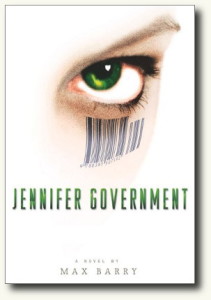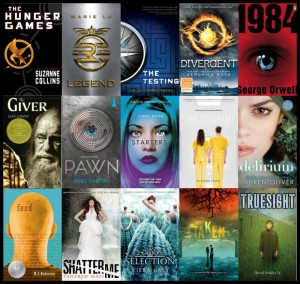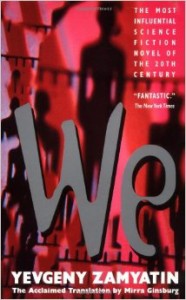We’re experiencing a paroxysm of Post-Apocalyptic Dystopian novels right now. Readers can’t seem to get enough of zombie uprisings, plague outbreaks, all-powerful dictators, nuclear fallout, or whichever version of Armageddon turns up on the bookshelves of late.
But let’s take a look at where some of these world-ruining horrors got their start.
These three novels were way ahead of their time, reflected the apocalypse-dystopia fervor of their respective decades, and influenced countless books and movies to come. They might not be the most well-known works, but they helped define the genre.
What sets We apart from George Orwell’s 1984 and Aldous Huxley’s Brave New World is that it was written by a former Bolshevik who actually lived through Joseph Stalin’s regime.
It was the first to describe what the dystopias that followed tried to: government monitoring, Thought Police, and media control. Orwell and Huxley both owe a debt to Zamyatin even if their works are more familiar.
We still sounds futuristic today, despite being written in 1921. You can see its influence in movies like George Lucas’ THX-1138 fifty years later. We was (of course) banned by the Soviet Union. Zamyatin smuggled the novel to the West then petitioned Stalin for a self-imposed exile.
The hero of We is D-503, engineer on the rocket Integral. He records a journal on the glories of the One State where all the walls are glass, people’s names are numbers, and sex is by appointment only. When D-503 meets the mysterious I-330 and learns she’s involved with the resistance, he must decide where his allegiance lies.
Read more about the novel here.
 A Canticle for Leibowitz by Walter M. Miller, Jr. traces the progress of humanity after a global nuclear war where members of a religious sect follow St. Leibowitz, a pre-war nuclear scientist, and try to decode his grocery list.
A Canticle for Leibowitz by Walter M. Miller, Jr. traces the progress of humanity after a global nuclear war where members of a religious sect follow St. Leibowitz, a pre-war nuclear scientist, and try to decode his grocery list.
The novel describes three distinct epochs, as mankind rebuilds from a Dark Ages, experiences a Renaissance, to once again possessing nuclear weapons, all while St. Leibowitz’s followers keep their faith. It was published in 1960 in the height of the Cold War when everyone was a doomsday prepper with a bomb shelter in the basement.
Leibowitz effectively lampoons the role of religion in history, as well as the idea of being nuked back to the Dark Ages. Fans of the Mad Max franchise will recognize Miller’s wry signature.
Read more about the novel here.
 Jennifer Government by Max Barry.
Jennifer Government by Max Barry.
Published in 2003 it foresaw the plutocracy of the early 21st century and the pervasiveness of corporate culture and greed while poking fun at the archetype of the “company man.”
It’s a chilling cautionary fable for the oligarchy that liberal pundits rail against (even as their campaigns receive funding from corporations.) In Jennifer Government the United States has taken over the Western Hemisphere and people’s last names reflect the corporations they work for (Nike, McDonald’s, etc.).
Jennifer, the titular character, works as a Government agent who must investigate cases of extreme guerilla marketing where customers who buy new Nike Mercury sneakers are murdered to build the brand’s “street cred.”
Read more about the novel here.
So, the next time you’re perusing the shelves for a good dystopian yarn, try these three lesser-known works. They’ll that show the genre’s been scaring us for a very long time.
Joshua Harding’s been a nuclear missile mechanic, environmentalist, cemetery restorer, puppeteer, carpenter, actor…and award-winning writer. He lives on a four-person artists’ colony in the woods of Illinois.
Follow him on Twitter: @jharding71
or his website: http://jharding71.wix.com/joshuajharding
If you are a writer and you want to be a contributor, email: admin@booksgosocial.com
If you are interested in book promotion, please visit http://thebookpromoter.com





Great post. New books to add to my reading list. Thanks so much.
I love “A Canticle for Leibowitz”, first read it back in 1978. However, are you confusing Walter Miller, the author (who died in 1996) with George Miller, who directed the Mad Max films? I think you are.